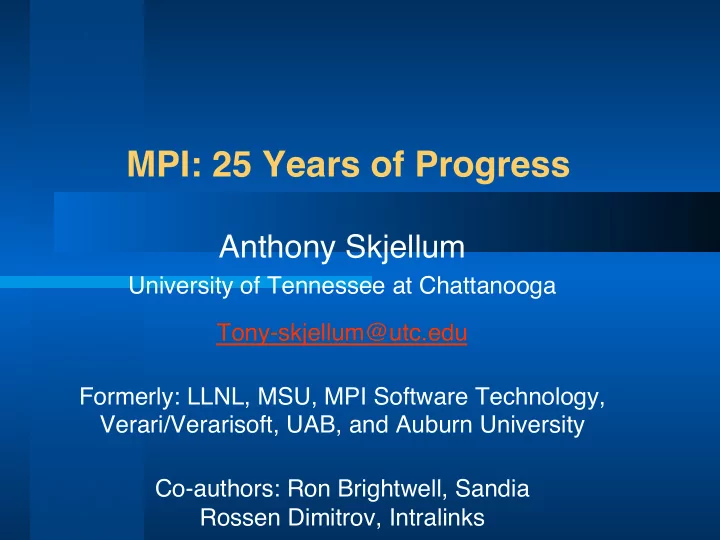

MPI: 25 Years of Progress Anthony Skjellum University of Tennessee at Chattanooga Tony-skjellum@utc.edu Formerly: LLNL, MSU, MPI Software Technology, Verari/Verarisoft, UAB, and Auburn University Co-authors: Ron Brightwell, Sandia Rossen Dimitrov, Intralinks
MPI: 25 Years of Progress Anthony Skjellum University of Tennessee at Chattanooga Tony-skjellum@utc.edu Formerly: LLNL, MSU, MPI Software Technology, Verari/Verarisoft, UAB, and Auburn University Co-authors: Ron Brightwell, Sandia Rossen Dimitrov, Intralinks
Outline l Background l Legacy l About Progress l MPI Taxonomy l A glimpse at the past l A look toward the future
Progress l 25 years we as a community set out to standardize parallel programming l It worked J l Amazing “collective operation” (hmm.. still not complete) l Some things about the other progress too, moving data independently of user calls to MPI …
Community l This was close to the beginning …
As we all know (agree?) l MPI defined progress as a “weak” requirement l MPI implementations don’t have to move the data independently of when MPI is called l Implementations can do so l There is no need for an internally concurrent schedule to comply l For instance: do all the data movement at “Waitall” … predictable if required only to be here!
How programs/programmers achieve progress l The MPI library calls the progress engine when you call any of most MPI calls l The MPI library does it for you ▼ In the transport, MPI just shepherds lightly ▼ In an internal thread or threads periodically scheduled l You kick the progress engine (Self help) ▼ You call MPI_Test() sporadically in your user thread ▼ You schedule and call MPI_Test() in a helper thread
Desirements l Overlap communication and Computation l Predictability / low jitter l Later: overlap of communication, computation, and I/O l Proviso: LJ à Must have the memory bandwidth
MPI Implementation Taxonomy (Dimitrov) l Message completion notification blocking blocking ▼ Asynchronous (blocking) independent polling ▼ Synchronous (polling) l Message progress polling all-polling ▼ Asynchronous (independent) independent ▼ Synchronous (polling)
Segmentation l Common technique for implementing overlapping through pipelining Segments Message m m/s m/s m/s Compute m/s Compute m/s Compute m/s Compute m Entire message Segmented message
Optimal Segmentation T ( s ) T no overlap T best s 1 s b s m
Performance Gain from Overlapping l Effect of overlapping on FFT global phase in seconds, p = 2 1.000 0.900 0.800 size Max Execution time [sec] 0.700 speedup 0.600 1M p=2 1M 1.41 0.500 2M p=2 0.400 4M p=2 2M 1.43 0.300 0.200 0.100 4M 1.43 0.000 1 2 4 8 16 32 64 Number of segments
Performance Gain from Overlapping (cont.) l Effect of overlapping on FFT global phase in seconds, p = 4 1.000 0.900 0.800 size Max Execution time [sec] 0.700 speedup 0.600 1M p=4 1M 1.31 0.500 2M p=4 0.400 4M p=4 0.300 2M 1.32 0.200 0.100 4M 1.33 0.000 1 2 4 8 16 32 64 Number of segments
Performance Gain from Overlapping (cont.) l Effect of overlapping on FFT global phase in seconds, p = 8 1.000 0.900 0.800 size Max Execution time [sec] 0.700 speedup 0.600 1M p=8 1M 1.32 0.500 2M p=8 4M p=8 0.400 0.300 2M 1.32 0.200 0.100 4M 1.33 0.000 1 2 4 8 16 32 64 Number of segments
Effect of Message-Passing Library on Overlapping l Comparison between blocking and polling modes of MPI, n = 2M, p = 2 0.500 0.450 0.400 0.350 Execution time [sec] 0.300 blocking 0.250 polling 0.200 0.150 0.100 0.050 0.000 1 2 4 8 16 32 64 Number of segments
Effect of Message-Passing Library on Overlapping l Comparison between blocking and polling modes of MPI, n = 2M, p = 8 0.500 0.450 0.400 0.350 Execution time [sec] 0.300 blocking 0.250 polling 0.200 0.150 0.100 0.050 0.000 1 2 4 8 16 32 64 Number of segments
Observations/Upshots l Completion notification method affects latency of short messages (i.e., < 4k on legacy system) l Notification method did not affect bandwidth of long messages l Short message programs ▼ Strong progress, polling notification l Long message programs ▼ Strong progress, blocking notification
Future (soon?) l MPI’s support overlap and notification mode well l Overlap is worth at most a factor of 2 (3 if you include I/O) l It is valuable in real algorithmic situations l Arguably growing in value at exascale l We need to reveal this capability broadly without the “Self help” model
Thank you l 25 years of progress l And still going strong … l Collective! l Nonblocking? l Persistent! l Fault Tolerant?
Recommend
More recommend